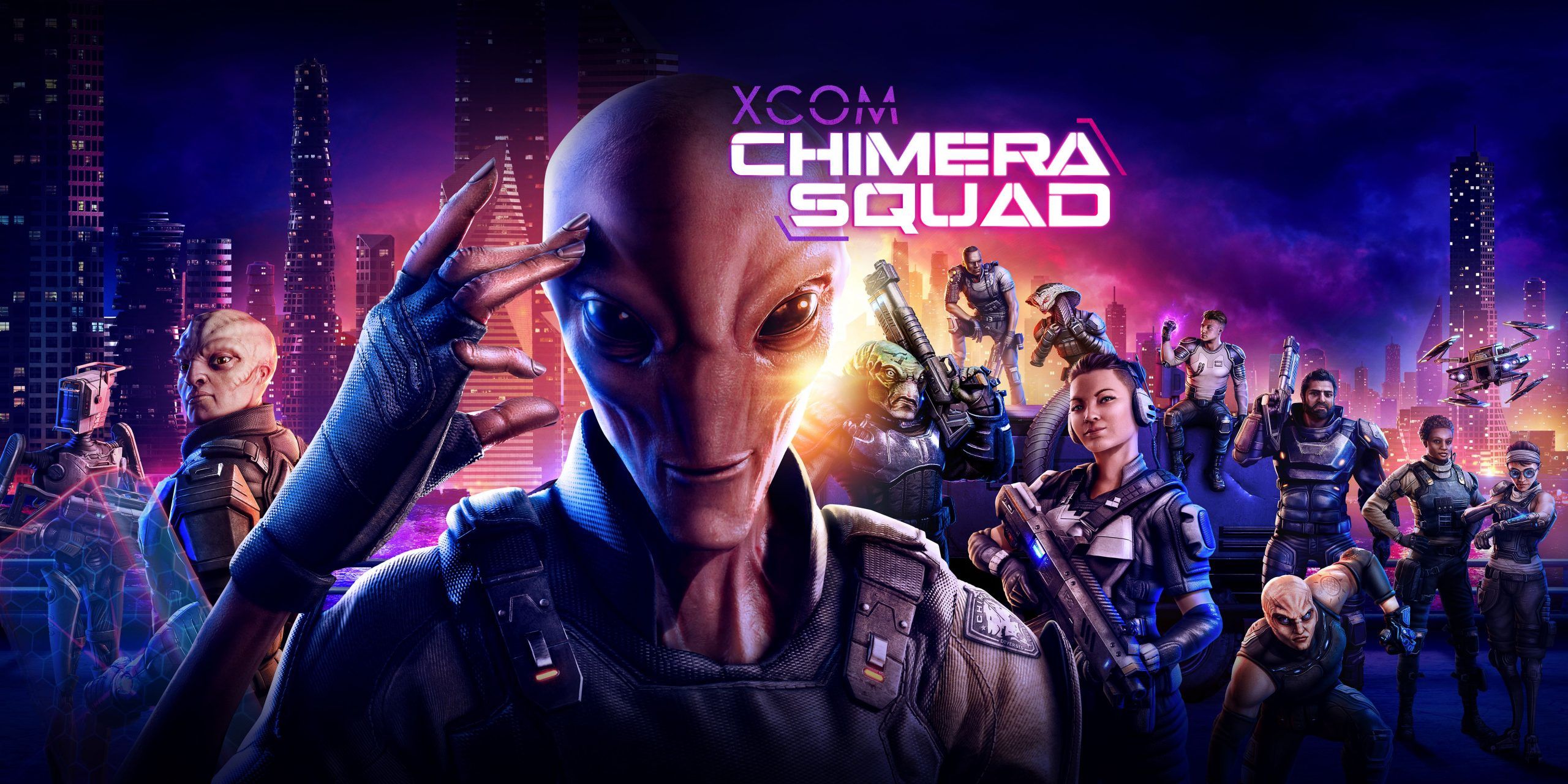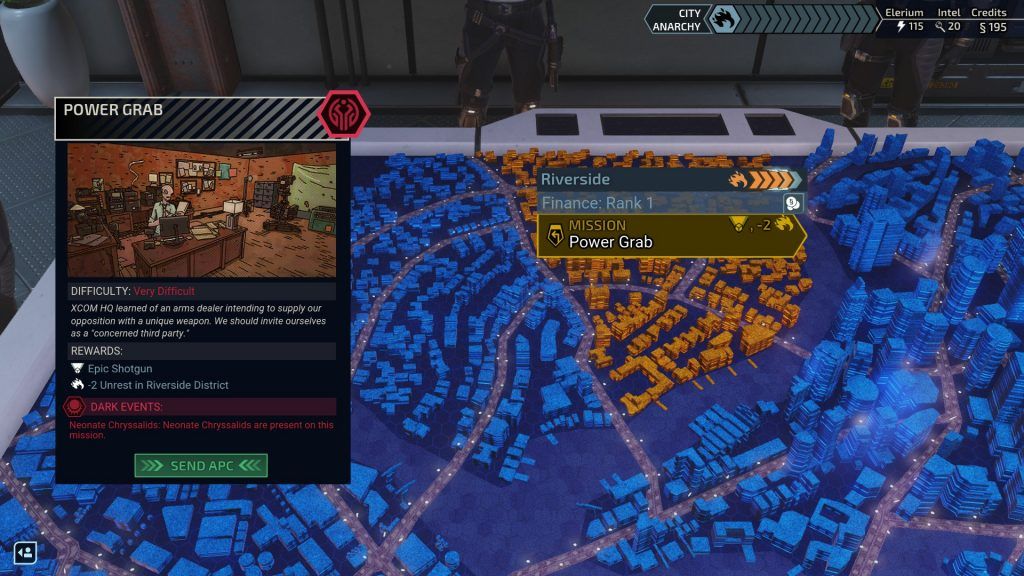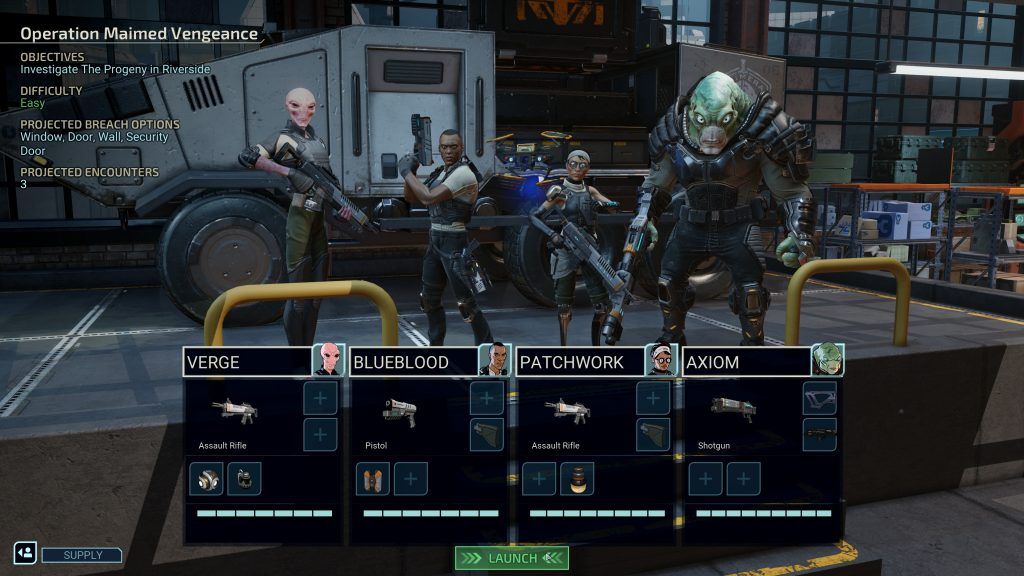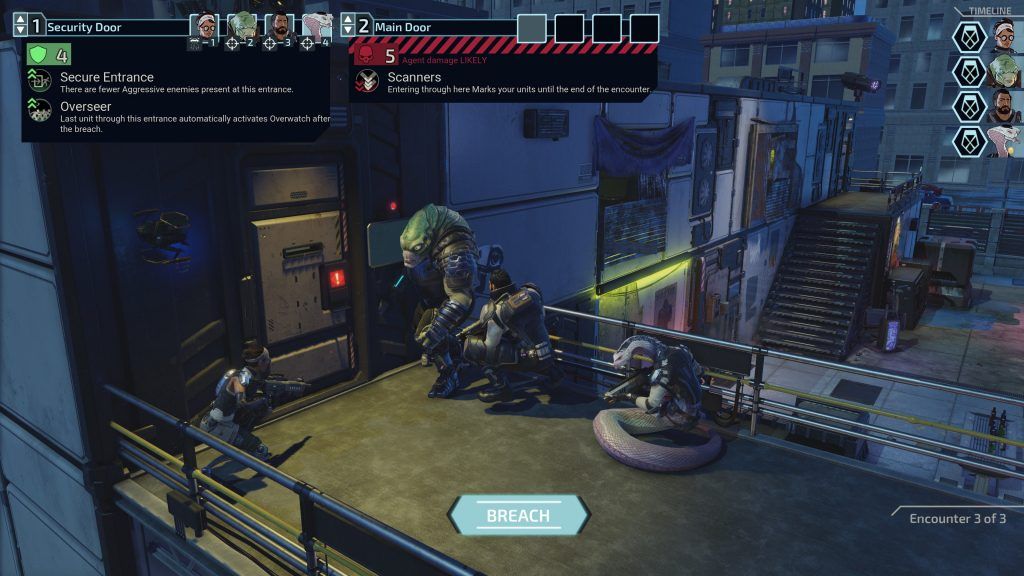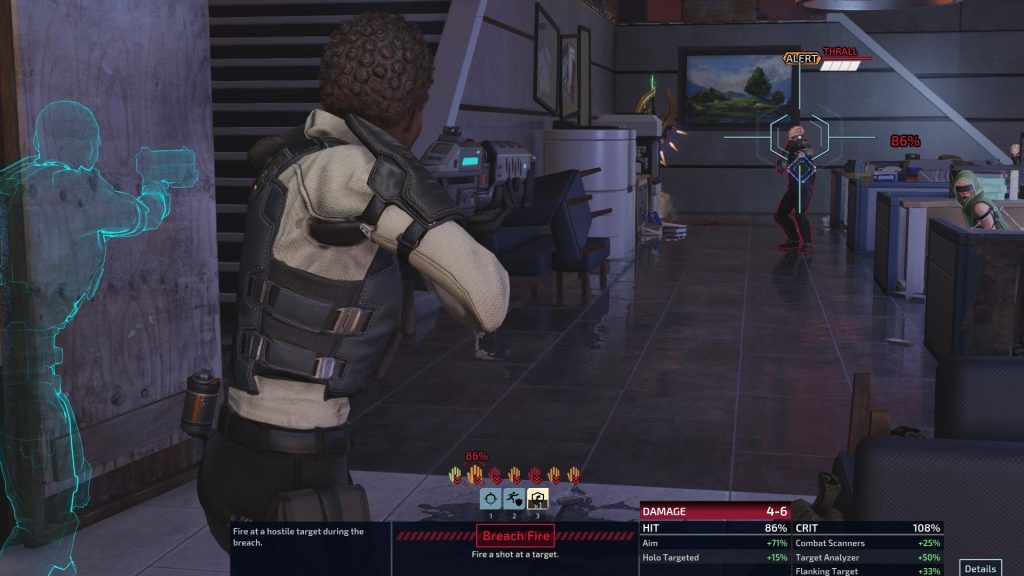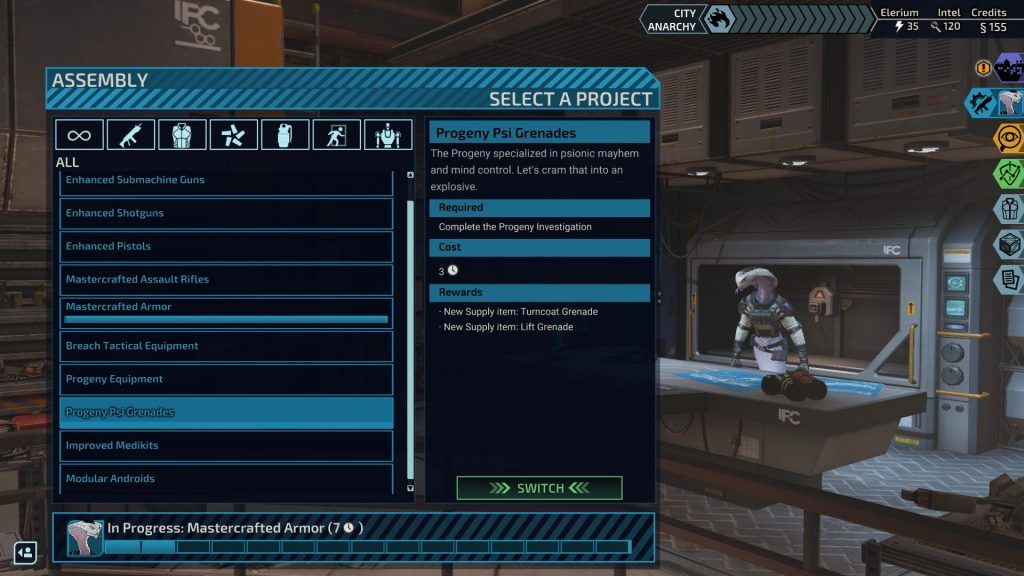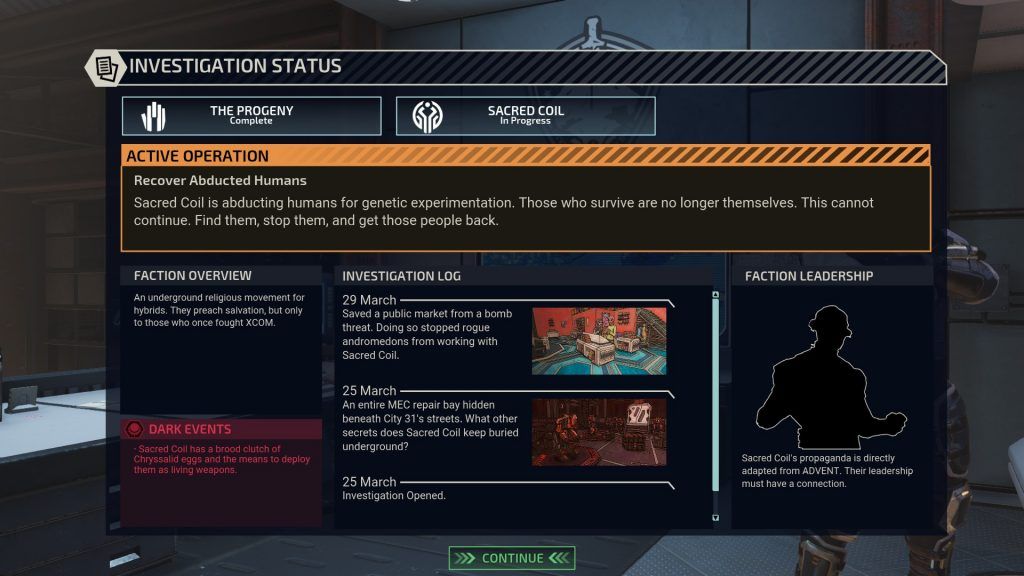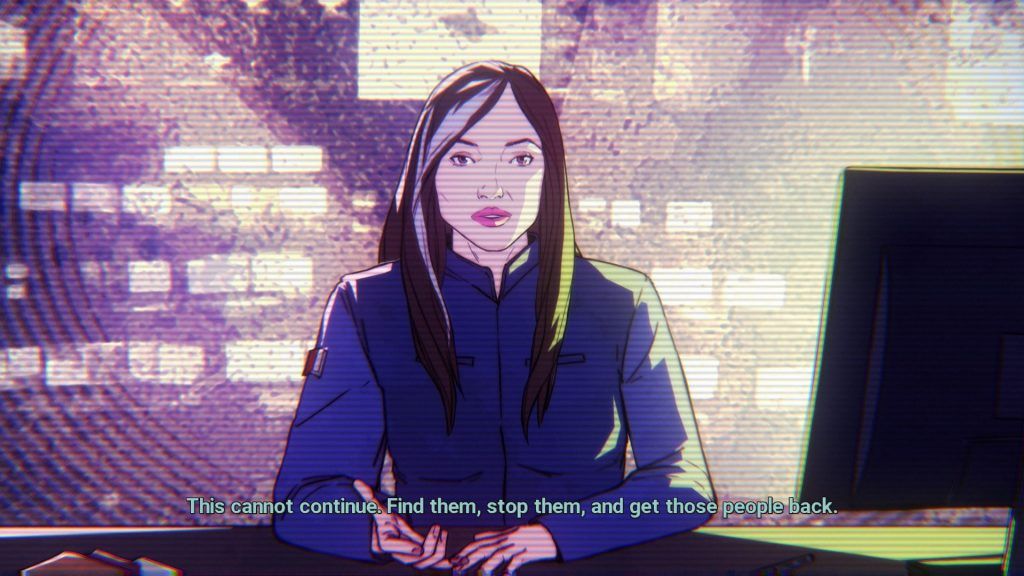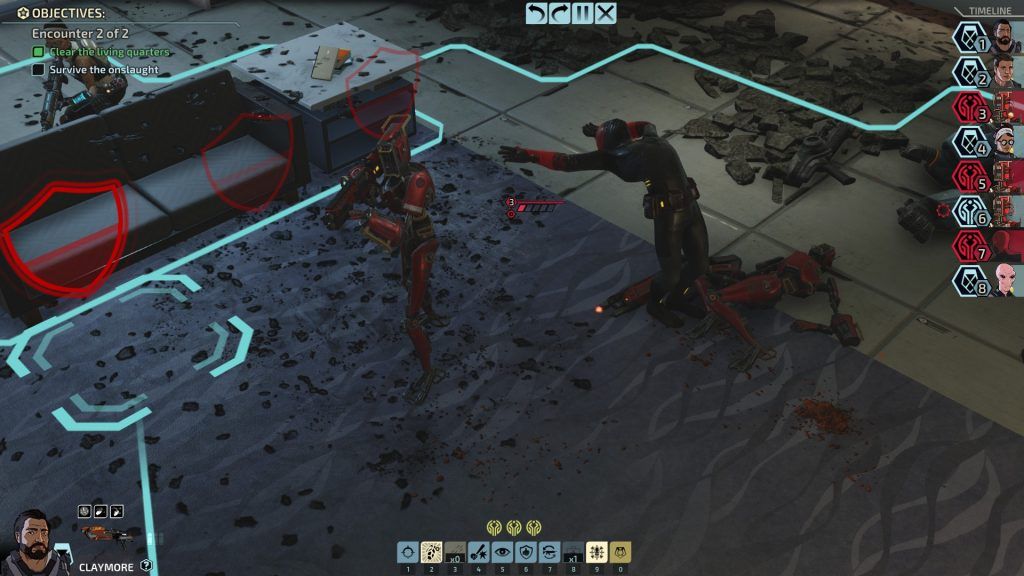XCOM: Chimera Squad is quite the pleasant surprise. It was announced without fanfare just a few days ago, slated to release less than a fortnight later. The dislikes on the reveal videos suggest that people were unhappy with it though, and I don’t exactly blame them. With the hints and setup for an XCOM 3? Chimera Squad looks nothing like that.
So let’s clear the air here. XCOM: Chimera Squad is NOT XCOM 3. It’s a spinoff made by a small team within Firaxis that takes the setting and gameplay formula of XCOM in a new direction. Most likely, it was XCOM 2 DLC that became its own standalone entity. But for all that, it is priced like a budget game and delivers a good amount of quality content. It’s not trying to be a full sequel, yet it should absolutely sate the appetites of those wanting more XCOM until such a release. All clear? Alright.
XCOM: Chimera Squad takes place five years after XCOM 2. Humans won the war against the invading aliens and drove off their Elder leaders to retake Earth. However, now there are many displaced extraterrestrials stranded on Earth with nowhere to go, looking to live a life free of their overlords. Given that we’re all sharing and rebuilding an Earth now, this leads to the formation of City 31, a place where all the species can try to coexist. That notion is challenged by tension from Elder sympathisers, rogue organisations rejecting coexistence, and just day-to-day chaos of a big city.
That’s where you come in.
[pullquote]"It’s not trying to be a full sequel, yet it should absolutely sate the appetites of those wanting more XCOM until such a release."[/pullquote]
The titular Chimera Squad is a division of XCOM deployed to City 31 to help the local police maintain order. Given that the squad is a mix between human and alien members, they’re as much an experiment as City 31 is. If the city falls or the squad fails, the prospect of peaceful coexistence on Earth looks bleak. Best not to fail, then. But as anyone who has played XCOM before knows, success won’t come easily!
Chimera Squad plays very similarly to the main XCOM games before it. It’s a turn-based strategy game where you outfit and lead a small squad to battle overwhelming odds. This is split up into two phases, each with their own strategic aspects: the overall squad and city management, then the missions themselves.
The management aspect plays as you might expect. You manage your base of operations, research and develop new equipment, kit out your soldiers, and train them as they gain experience. With luck, your rookies will one day become hardened elites. How this spin-off differs from prior XCOM games is in scope. Instead of trying to manage a globe-trotting force saving the whole world like in XCOM 1 and 2, Chimera Squad is confined to a single city split up into numerous districts. Classic, pre-reboot XCOM fans may recognise the XCOM: Apocalypse vibes.
Leaving situations to fester in specific districts will gradually lead to unrest and anarchy. Too much anarchy, and it’s game over as City 31 collapses around you. Choosing which missions to tackle and when is crucial to keeping unrest in check. There will be times when you have to let a situation get worse because you really need the resources from a different mission. Other times, you’re managing which crisis out of three you can address in a turn with arguably no correct answer.
One of the most notable differences for Chimera Squad is that you have a specific roster of characters to assign for your squad. Gone are the human squaddies that you can tailor-make and develop a story for based on their campaign experience. Instead, the characters of Chimera Squad are actually characters. They have their own personalities, quirks, and banter in between missions and tense moments that really gives them life. I didn’t expect to like this aspect, but it really ends up filling the game with charm. This is backed up by radio broadcasts and vignettes detailing life in City 31, and I really grew attached by the end.
[pullquote]"Gone are the human squaddies that you can tailor-make and develop a story for based on their campaign experience. Instead, the characters of Chimera Squad are actually characters."[/pullquote]
There’s a total of 11 agents in Chimera Squad, but you start with four and gradually unlock up to eight in a campaign. The initial tutorial campaign has a select four chosen for you, but subsequent playthroughs let you pick your starting squad. Later recruitment phases in the game will let you pick from one of three options randomly. Mechanically, each character has their own class and abilities unique to them, as well as a specific weapon type. As they rank up, you’ll gain new abilities or improvements, and every second rank lets you choose between two options to tailor-make them.
Missions are the meat of any XCOM game, though. Once you’ve picked your mission and outfitted your squad, you’ll be launched into an encounter, of which each mission can have up to three. These encounters are further split up into breach and regular phases. The breach phase will let you select which method of entry that your squadmates will take. This changes depending on the mission in question. A warehouse bust might see you choosing between the main door, side door, breaching the wall with a charge, or a combination of the above. If you’re raiding a top floor penthouse, you might rappel down and bust in through windows. Further methods can be made available by equipping specific breach items. Other breach items will let you soften up the enemy once you door kick, like tossing in a flashbang to start.
Once you’ve committed, you’re given a single round to pick and choose from the targets close to the entrance. You can shoot or use some specific abilities, it’ll resolve normally, and then you’ll quickly move to cover. If enemies were alert and perceptive on breach, they’ll get their own shots in. You can try to soften up bigger enemies, take out the surprised ones that are easier to hit, or snipe the aggressive ones before they get reprisal shots.
From there, the combat will move into the standard turn-based fare. You’ll get two actions to move around and use abilities, and committing to an attack will end your turn. Upgrades or situations might allow you to attack without ending your turn, or else gain bonus actions. Some abilities will have a cooldown of a couple of turns, but others can only be used once per mission, so pick the encounter in which you deploy them wisely. This once-per-mission limitation also affects consumable items. That said, they come with a hefty improvement from prior games: most don't consume an action to use. As such, the various grenades will become crucial to maximising your action economy and gaining the upper hand.
Using your actions has a percentage to hit and crit. It’s a lot easier to hit an enemy that you’re flanking and who is out of cover, but much harder to hit the guy behind a building a city block away. The same is true of your enemies however, so taking cover and positioning carefully is crucial to success. Plus, as any true XCOM player knows, 99% is not 100%. I absolutely missed a shot in the high 90s percentile, whereupon the surviving enemy crit another agent to knock them out, forcing a cascade of disaster that saw the mission fail. That’s XCOM, baby! It’s something you’ll learn to be mindful of right away, or you won’t get far.
Previous XCOM games would alternate between player and enemy turns, with most enemies hidden by fog of war until you moved up and alerted them. Chimera Squad instead reveals everything in an encounter immediately, and turns are shared by both factions. A timeline is displayed that shows the move order, determined mostly by stats. This further lets you pick and choose your targets, and playing smart can see you eliminating enemies before they get a chance to move at all. Otherwise, it’s a case of mitigating what they can do to your squad since you’re probably grossly outgunned at first.
[pullquote]"I absolutely missed a shot in the high 90s percentile, whereupon the surviving enemy crit another agent to knock them out, forcing a cascade of disaster that saw the mission fail. That’s XCOM, baby!"[/pullquote]
Encounters will have their own objectives; it’s usually a case of clearing the room, retrieving an NPC/item and getting to evac, or surviving a wave onslaught. After the encounter is cleared, your squad will reload their weapons and heal up to a threshold (which you can set or disable at the start of a game if you want a challenge) before the process repeats. After every encounter is done, the mission is cleared. You’ll get your rewards -- either currency to utilise in the management aspects, or new gear to outfit your squad with -- and proceed on with the campaign.
Given that the characters in Chimera Squad are actually characters, death is no longer an option. If their health is reduced to 0, they are left Bleeding Out. If you can’t stabilise them within three rounds (or if they’re hit by an explosive of some kind), then they’ll die. The mission is over and you’ll be forced to restart that encounter. Downed characters develop a “scar” after the mission if they're saved, which is a permanent debuff that remains until they’re given corrective training. They’ll be out of action in the meantime, so you’ll have to choose between suffering the drawback or making do without. In the earliest parts of the campaign, before you get your full squad on hand, you might not even have that option.
Other XCOM games could see your members killed outright and be gone forever. Sometimes they'd just be bleeding out to be stabilised, but it wasn’t something you could rely on. Losing a member could have drastic ramifications on your capabilities, and a wipe of your best squad could effectively doom your campaign. This was a big factor that many XCOM fans appreciated. Completing an Ironman run that disables saves and reloads was a real achievement. Its omission is a contentious point, but I think it suits the style that they’re going for with Chimera Squad, even if I appreciate the traditional XCOM formula more. This is akin to playing Fire Emblem on Casual, effectively.
Still, there are a lot of options on offer. The standard four difficulties (Story, Normal, Classic and Impossible) are present. Ironman and Hardcore modes can be enabled as well. Ironman still disables your saves, and forces you to restart a mission on a death -- rather than just the encounter -- which makes the longer set pieces quite challenging. Hardcore takes this one step further by ending your campaign entirely on a death, with the save deleted outright. Specific modifiers can be enabled to make it more relaxed, or else just make a campaign replay punishing.
Campaigns themselves are divided into parts. Once you start a run and select your opening squad, you’ll be given a choice of three enemy factions to focus your attention on. Loosely translated, your options are Psionic heavy, Alien/Plasma weapon heavy, or Mech/Tech heavy. Your missions will deal with that faction until they are completely shut down. Further choices will occur within these faction investigations that you let focus on one aspect of their operations, but let the other fester. Want to eliminate Andromedon links to one faction? Now they’ll mass produce androids instead.
After a faction is eliminated, you’ll choose your next target and proceed until all three are eliminated. Depending on the order you face them, they’ll further increase in strength and gain access to mercenaries, new units, or other threats. It also changes the mission layout and plots on each run. Fighting the alien faction first in the campaign led me to a completely different mission than when I fought them last. There’s a meta content tracker to show you how much of the game you’ve seen, so you’ll want three playthroughs at least to see all possible permutations. Once you've beaten the other factions, you piece together intel on the shadowy fourth faction manipulating them all, and they're your foe during the finale.
[pullquote]"I was able to finish a Normal playthrough in about 15-20 hours. [...] I promptly started a new campaign, cranked it up to Ironman Impossible, and got thoroughly demolished."[/pullquote]
I was able to finish a Normal playthrough in about 15-20 hours. The earlier stages were the roughest, but it didn’t take me long before I knew my squad, picked my strategy, and had the equipment to be a dominant force in City 31. I promptly started a new campaign, cranked it up to Ironman Impossible, and got thoroughly demolished. That’s a pet project for me to tackle in the coming weeks. The variety of options and “everything is descending into crises” potential for Chimera Squad isn’t as high as it was in XCOM 2 (and that’s to say nothing of the Long War mod), but they exist and they’re fun to play around with.
Presentation wise, the graphics and designs are functional and varied. They manage to shake up the locales of City 31 enough to keep it from feeling too samey. Sound and music is fairly strong, and voice acting is mostly good. The cutscenes are animated images rather than fully rendered models, but they’re well stylised and have a very synthwave palette to them, so it hardly detracts from the overall package.
There are bugs, however! Graphical issues and animation absences were a fairly common feature of my playthrough. Breaching, in particular, would see characters unable to keep up with the rapid target swapping possible, so shooting from the side of their guns was a common occurrence. There were also plenty of instances where objects or cover would be destroyed but pieces would continue to float in the air. Some of the enemy ragdolls on death were hilariously distracting.
It was also not uncommon to commit an action, see it start, but the animation would get stuck or fail to load. There’d be a brief few seconds of wait, then things would adjust as if the effect had gone off as planned. A couple of times, I’d catch an enemy in overwatch and shoot them, and they’d finish their turn as normal. It would then quickly reset them to the start of their turn and they’d carry out a new one, as if they changed their mind after getting shot. They still took the damage, so it was just a visual effect that even occurred when the enemy was already dead. Still, these all added up.
Beyond the presentation hiccups, I had at least two instances where the game froze and forced a restart. But the biggest issue was a nasty game-halting bug, where every one of my submachine guns vanished permanently. Unlike in XCOM 2, there was no way to replace them, as they’re set gear pieces depending on the character. Because they were without weapons, it wouldn’t let me deploy those units to combat ever again. With only eight units, and three of them using SMGs in that run? I couldn’t field most of my squad reliably, so I was forced to restart, losing multiple hours of progress.
I suspect this was a bug left over from Chimera Squad’s obvious nature as being built from XCOM 2 content. See, some of the missions allow you to get “epic” weapons, which have a unique ability for each. Aside from assigning these in your loadout, you otherwise have no need to swap out the basic weapons and can’t build new ones. Since I was swapping the unique one to whichever SMG-wielder I was fielding for a mission rather than assigning it to just one, this seemed to cause the issue. In my full playthrough, I just assigned them to a character and left them there. No issues followed.
Given that this was a pretty major bug, I felt the need to detail it as such. Still, even after losing multiple hours, I restarted the campaign and changed up my strategy and loadouts. Despite the setback, I nonetheless had fun, and that’s the nature of XCOM in general. There's always the chance that this was a bug for the review build that'll be fixed via Day 1 patch, but be advised regardless.
[pullquote]"The smaller scale, tighter scope, and focused nature of Chimera Squad was honestly a refreshing change, and I really did appreciate what was on offer here."[/pullquote]
So, to summarise: Chimera Squad is a decently content-rich XCOM title with a bigger focus on set characters, released by a smaller team on a budget as a standalone while XCOM 3 is (hopefully) being developed. You don’t have quite as much freedom in options, research, and macro strategy as a full game XCOM game, but neither are you stifled or limited. The smaller scale, tighter scope, and focused nature of Chimera Squad was honestly a refreshing change, and I really did appreciate what was on offer here.
Despite the occasional bugs or hiccups, I enjoyed my time with Chimera Squad quite a bit and would heartily recommend it to series and strategy fans. It’s also debuting at half price of an already cheap MSRP, so this stands as an unexpected surprise in an otherwise crazy year. If XCOM 3 is still a ways off, I'm more than happy filling the time with these small and focused glimpses into the setting like this. X-COM Enforcer, this ain't.
XCOM: Chimera Squad
- Franchise
- Xcom
- Platform(s)
- PC
- Released
- April 24, 2020
- Developer(s)
- Firaxis Games
- Publisher(s)
- 2K
- Genre(s)
- Turn-Based Strategy
- ESRB
- T For Teen due to Blood, Language, Violence

